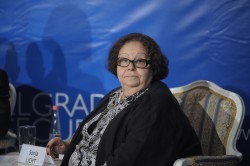Session 4: Global Civics in the World in Crisis
(in cooperation with the Global Civics Academy)
For the last two hundred years, human beings have increased their control over their lives through technology and democracy. We have become increasingly capable authors of our destinies. Yet more recently, our lives have started to be co-authored by others, others whom we do not know and may not even like. Financial engineering in the US has the potential to determine growth and employment patterns anywhere in the world. Emissions from China influence global temperatures and precipitation; a pandemic in Mexico can and does determine public health around the world. How to deal with this growing interdependence is one of the most vexing questions of our time. Some have suggested what is needed is not a technocratic debate about global governance, but a conversation about a minimalist global civics that can inform our increasing interdependence.
Discussion topics:
- Is a global civics possible, necessary or feasible?
- How do China, Europe and the US respond to global civics?
- Global civics argues that for the first time in human history a 20-year-old has more shared interests with other 20-year-olds halfway around the world than with 70-year-olds in her own country. Can this really be true?
- Where will global civics be incubated, hatched, forged and contested?
- Does a global civics discussion belong in a security forum?
Speakers:
Hakan Altinay‚ Nonresident Senior Fellow, Brookings Institutions
Elizabeth Filippouli‚ Founder and CEO, Global Thinkers
Daniel R. Fung‚ Member of Chambers, Des Voeux Chambers
Markus Jaeger‚ Head of Migration Co-ordination Division, Council of Europe
Sonja Licht‚ President, Belgrade Fund for Political Excellence (Moderator)





